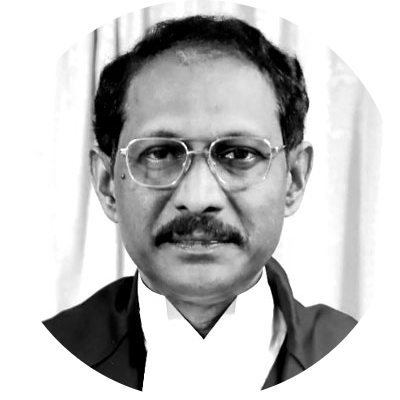C.T. Ravikumar

C.T. Ravikumar
Former Judge of the Supreme Court of India
Assumed Office31st Aug, 2021
Retired On5th Jan, 2025
Previously
Permanent Judge of the Kerala High CourtDecember 15th 2010-August 30th 2021
Additional Judge of the Kerala High CourtJanuary 5th 2009-December 14th 2010
EnrollmentJuly 12th 1986
Profile
Early life and education
Justice Chudalayil Thevan Ravikumar was born on 6 January 1960 in Peermade, a hill station in Kerala. His father was a bench clerk in the Judicial First Class Magistrate Court, Changanassery.
Justice Ravikumar graduated in Zoology from Bishop Moore College, Mavelikara. Subsequently, he completed his law degree from Government Law College, Kozhikode.
Career as an Advocate
Justice Ravikumar enrolled in the Bar Council of Kerala on 12 July 1986. He practised law in Mavelikara until he decided to move his practice to the Kerala High Court in Ernakulam, taking the advice of former Chief Justice of India K.G. Balakrishnan.
In the High Court, he mainly worked on civil, criminal, labour and service matters. Between 1996 to 2001, Justice Ravikumar served as a Government Pleader. In 2006, he was appointed as a Senior Government Pleader.
Career as a Judge
After practising in the Kerala High Court for over 20 years, Justice Ravikumar was appointed as an Additional Judge in the Kerala High Court on 5 January 2009. On 15 December 2010, he was appointed as a Permanent Judge.
During his time as a High Court judge, he was the President of the Kerala Judicial Academy and also served as an Executive Chairman of the Kerala State Legal Service Authority.
On 17 August 2021, the Supreme Court Collegium led by former Chief Justice N.V. Ramana recommended Justice Ravikumar and eight other judges to be elevated to the Supreme Court.
Justice Ravikumar was the 15th judge from Kerala to be elevated to the Supreme Court. He became the fifth Kerala High Court judge to be appointed to the Supreme Court without occupying the position of the Chief Justice in a High Court.
Justice Ravikumar was the second senior-most judge in the Kerala High Court at the time of his elevation. Often, judges are elevated to the Supreme Court according to the seniority norm but the Collegium sometimes deviates from standard practice by appointing judges who may be relatively junior.
Justice Ravikumar is among the three sitting judges of the Supreme Court who belong to the Dalit community, alongside Justices B.R. Gavai and P.B.Varale, appointed in January 2024.
He is set to retire in January 2025 after a four-year long tenure.
Justice Ravikumar authored 99 judgements and has been a part of 373 benches.
Thirty-nine percent of Justice Ravikumar’s judgements were in criminal matters. He has also sat on benches deciding on civil (9%), property (17%), and family (10%) matters.
Notable judgements
In N.N. Global Mercantile v Indo Unique Flame Ltd (2023), Justice Ravikumar wrote a concurring opinion in a five-judge Constitution Bench which in a 3:2 majority held that an unstamped arbitration agreement was void and unenforceable. This judgement was reversed in a curative petition by a seven-judge bench led by Chief Justice D.Y. Chandrachud.
In Srikant Upadhyay v State of Bihar (2024), Justice Ravikumar, leading a Division Bench, held that while bail is a rule in criminal cases, the same does not apply for anticipatory bail. He explained that “anticipatory bail” should be left to the “cautious and judicious discretion” of the court depending on the facts and circumstances of the case. His Bench was hearing an appeal from the Patna High Court, where the High Court refused to grant anticipatory bail to a person accused of assaulting a woman. The Bench upheld the Patna High Court’s decision.
Justice Ravikumar was on the three-judge Division Bench in Vijay Madanlal Choudhary v Union of India (2022) which upheld the wide investigative powers of the Directorate of Enforcement and the restrictive bail conditions under the Prevention of Money Laundering Act, 2002. A review against the judgement is pending in the Supreme Court.
In Common Cause v Union of India (2023), Justice Ravikumar was on a five-judge Bench which modified the 2018 Euthanasia Guidelines to make the fundamental right to die with dignity more accessible. The Constitution Bench observed that the 2018 Guidelines were cumbersome for terminally ill patients who were unable to communicate their wishes.